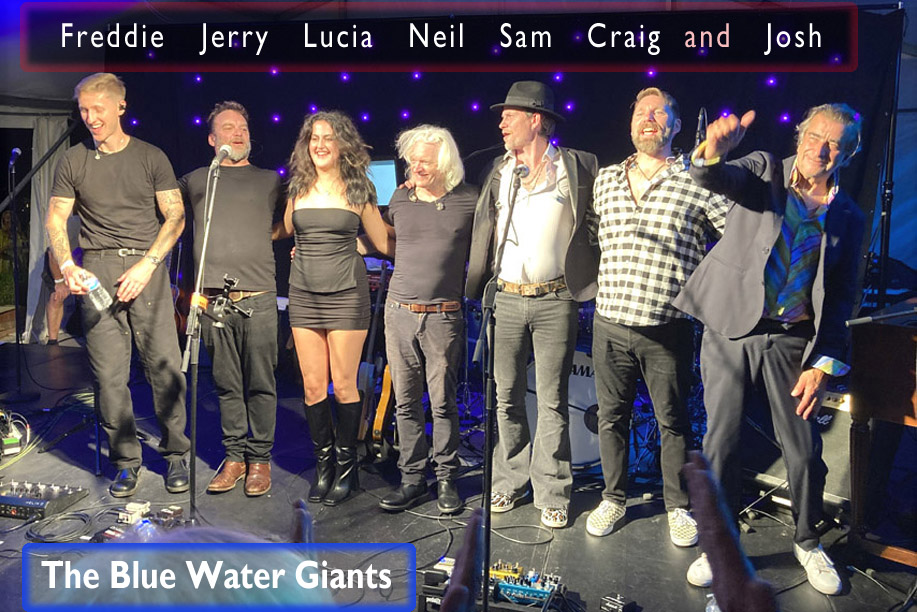|
So who – in their right mind or otherwise – would welcome the idea of a band dedicated to recreating the classic songs and sound of Procol Harum on stage? As a veteran of 99 live Procol shows given by a multiplicity of line-ups, I suppose I incline to the view that their sound cannot be counterfeited now, given the absence of the band’s only constant, Gary Brooker. Any distinctive vocalist is irreplaceable, of course … but Gary’s particular tone, range, and expressiveness were unrivalled in my experience. So an ersatz Procol Harum, I thought, would serve primarily as a reminder of irretrievable majesty and power. I haven’t played a Procol record since Gary died … I don’t look forward to those moments of melancholy … and I certainly wouldn’t pay to endure ninety minutes of similar disappointment in concert.
But I don’t think there will be much debate about the new band created by latter-day Procol organist and evangelist Josh Phillips. He invited me and my companion to hear his outfit, The Blue Water Giants, one sunny Saturday evening in August 2024 … and I have to say, it was a revelation. The setting was not one in which I expected to feel at home: The Royal Southern Yachting Club, way down in Southampton UK, more-or-less opposite the Isle of Wight, close to where the Phillipses now live (I’m told the family vessel can be glimpsed, at anchor, from their dwelling). And the event was a private members’ party: a sold-out, standing venue on the waterside, with two days of bands playing to a non-specialist audience whose shared interest was – I guess – the party atmosphere, not any particular repertoire. Josh Phillips has gathered a redoubtable crew of seasoned musos, and the band boasts a genuinely unique selling point. It plays nothing but proven hit songs to which – either on stage or on the original records – at least one of its members has contributed. To put it another way, the band collaborates to present, in turn, great songs that brought them to where they are today professionally. Versatile, adaptable, and open-minded, this band of enthusiasts radiated optimism and shared enjoyment before they’d played a note. This was no po-faced, reverent recital. Blue Water Giants is like a six-piece party band, one whose authenticity and virtuosity threaten again and again to divert the listening throng from any other revelling. Attending this concert was a bit like listening to a radio station pumping out AOR hits of the eighties, nineties and more … Status Quo, Tears for Fears, Robbie Williams, Tina Turner … but with a difference: the music’s live, and the band has the chops to evoke the original songs, and their era, without slavish replication.
But there’s a problem, surely, even with such a deftly-curated setlist: a sequence of top AOR chart hits, with their often-common structures, duration, ‘density’, would not make for a varied evening. And that’s exactly where a variety of aces starts to spill from the sleeve of Maestro Phillips. Ultravox’s Vienna, for instance … misty, stately, lyrically opaque … a hit from his days with its co-composer, Midge Ure. Such stillness: a glacier calming the pyroclastic flow. And similarly, only far more so, the five featured Procol Harum songs. The Thin End of the Wedge, Dead Man’s Dream, Strangers in Space, Perpetual Motion, Still There’ll be More: if I’d set my heart on hearing those, I’d have been somewhat disappointed. But the five songs he chose, although they were ‘inevitable’ standards in any echt Procol set, acquire a completely unexpected new value in this fresh context. They’re gems, reborn. The audience recognises them all, perhaps not by name of song or band, but by their unmistakable quality of construction, melodic invention, harmonic freshness, and the effortless mystery of their words. A Salty Dog chills the party-clatter to a whisper. A Whiter Shade of Pale elicits full-throated singing-along (though mine was the only voice to shout ‘more’ at the once-traditional point in Verse One); Homburg has people turning to each other in wonder, as if to say ‘Bloody hell, I remember this record … what a thrill to hear it live’. And Pandora’s Box, with its so-characteristic Brooker stop/start structure, provides cues for expressive audience-dancing such as one never saw at an actual Procol recital.
The sound team had got things largely under control by the start of Steamy Windows; Neil Taylor (guitar) prefaced it with a brief anecdote about recording the session with Tina Turner present in person, to his surprise (all through the evening such anecdotes of provenance were delivered with self-mocking humour rather than sycophantic self-aggrandisement). Sam Tanner, at the piano, sang with winning verve. The band had already got people gyrating.
Another Procol hit followed immediately, Pandora’s Box: the introductory mallets sounded more vibraphone than marimba, and texture was appetisingly clear … perhaps thanks to Freddie Edwards’s shift to acoustic guitar. The band was chugging away like 1973 Procol, when they aired this old song experimentally in America before it was re-invented with Lieber and Stoller. As in the previous number, the Hammond came through well, especially in the Emersonesque coda. Love Changes (Everything) brought an additional musician to the stage, young backing vocalist Lucia Valentine, a striking presence. ‘She’s better looking than me,’ asserted Sam Tanner, to which another voice from the band joshingly added, ‘She’s better looking than Josh an’ all!’ I guess that comparison was motivated by an interest in genetics … they are father and daughter (Lucia’s own band was scheduled for the following day, but I was sadly obliged to miss it this time around). Original artists Climie Fisher were perhaps not a well-known name … but the song reaped an appreciative response.
At this point the band left the stage for an interval. Our genial compère (‘Bill’, I think), who had started the show not only with a proud recital of each musician’s pedigree, but also with a very sensible admonition to the throng that inveterate talkers should stay at the bar, remarked that the whole weekend had been ‘… put together by our own Josh Phillips and Gordon Craigen, the best Commodore we’ve had in years.’ Craigen was keen to go on record, telling me that this was the fourth time the Blue Water Giants had played his venue, and that the whole place – 420 pricey tickets – was sold out. ‘For a private members’ club that’s not bad,’ he confided, ‘but this band needs a bigger audience.’ Someone from the audience – who’d perhaps missed Conquistador – had asked for a ‘real rocker’ in the second half. But the band returned to the stage with the Ultravox standard, Vienna, full of contrast and buoyed along by Sam Tanner’s emotional vocal. Conspicuous eye-contact among the musicians enabled them to negotiate the textural changes in this somewhat amorphous song with skill. But the real ‘belter’, in my terms at any rate, was the next number, their most ambitious by far. Josh dedicated A Salty Dog to Gary Brooker ‘who wrote this when he was 22, isn’t that right, Roland?’ (I think he might have been 23, but the point was well made). Tanner’s salty vocal had a real soul feel, and his exceptional breathing control contributed to an impressive emotional contour from start to finish, all this while playing impeccable piano. I didn’t quite get the chills one felt when the composer sang the song, but the frisson of nostalgia at hearing it again, so capably done, was unmistakable. The lead guitar was strongly influenced by Geoff Whitehorn’s melodic orchestration, and the second guitar played with great restraint, judiciously emphasising certain dramatic sections. Craig Alexander’s drum intro didn’t follow the famous BJ pattern exactly, and it was one of a number of high-profile fills he contributed at different parts of the song. Bold, capable … but perhaps ‘not enough rubber in his arms’ as Gary once characterised Procol stand-in Ian Wallace to me. But there was a very positive reaction to this performance, the nautically-inclined audience receiving the song as the great hit it should have been in 1969. ‘Gary would be very proud of you,’ said Josh to his cohort.
Then a pair of Status Quo hits raised the temperature even further, Craig, Neil and Josh supplementing the incisive Tanner vocal lead on Caroline (which was distinguished by some top-drawer rock piano too), and even the most ancient audience members dancing to Rocking all Over the World, in which the heavy organ and piano combination, and the rising ‘Drunk Again’ bassline, sounded for all the world like a lost Procol belter.
The biggest hit of the evening was naturally saved until last. A Whiter Shade of Pale, led by its beautifully-played organ line with, needless to say, the absolutely authentic drawbar registration, ushered in a big crowd singalong. Perhaps because of the massed participation the performance had a slightly matter-of-fact quality, but Sam Tanner’s blue-eyed soul voice was so close to the mark that I imagine a great majority of the listeners would have taken him for the original singer … if he were about twice his apparent age! He put a slightly conversational spin on some of the second-verse words, which emphasised the fact that – despite his ample chops – he’s not going for a carbon-copy approach … which is very reassuring. The stately ending … heavy cadences, none of the free-fall piano twiddles of yore … was superb.
Of course it’s not the real Procol – that’s gone ‘into the darkness of the darkness for ever’. But, if I may repurpose the Doobie words that rang in our ears as we set off home to Bristol, ‘What seems to be / is always better than nothing at all’. I don’t suppose I’ll get to see this band 99 times; but once was certainly not enough. |
|
PH on stage | PH on record | PH in print | BtP features | What's new | Interact with BtP | For sale | Site search | Home |
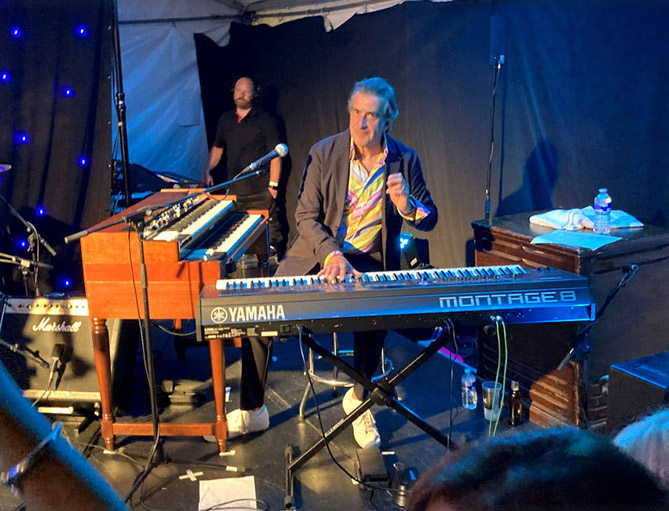
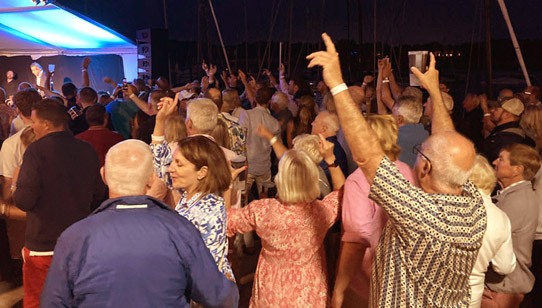
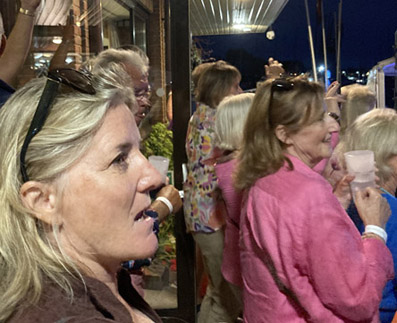 Only Conquistador failed
to cut the proverbial mustard, albeit through no fault of the players, who
delivered terrific energy to start the show. The playback PA had been crystal
clear for the taking-the-stage music (an excerpt from Mozart’s 40th Symphony,
doubtless chosen for its classiness and G minor tonality). But the Giants’ giant
sound was swamped with distortion such that one could hear no Hammond at all,
though the organist's lightning fingers suggested we were missing an exciting
solo. Many a historic Procol show, however, has kicked off with this risky
song and a wonky sound-balance, and I was hugely relieved: this was
clearly going to be an evening of edgy rock excitement rather than
suavely-manicured showbiz.
Only Conquistador failed
to cut the proverbial mustard, albeit through no fault of the players, who
delivered terrific energy to start the show. The playback PA had been crystal
clear for the taking-the-stage music (an excerpt from Mozart’s 40th Symphony,
doubtless chosen for its classiness and G minor tonality). But the Giants’ giant
sound was swamped with distortion such that one could hear no Hammond at all,
though the organist's lightning fingers suggested we were missing an exciting
solo. Many a historic Procol show, however, has kicked off with this risky
song and a wonky sound-balance, and I was hugely relieved: this was
clearly going to be an evening of edgy rock excitement rather than
suavely-manicured showbiz.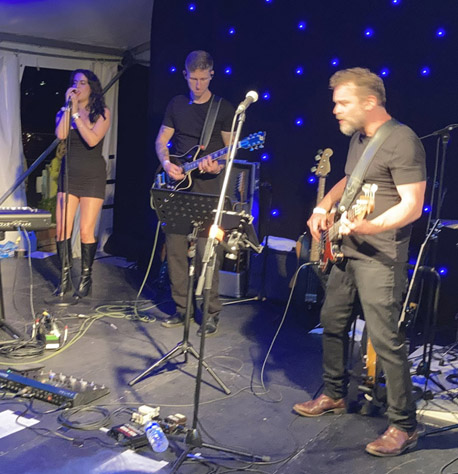
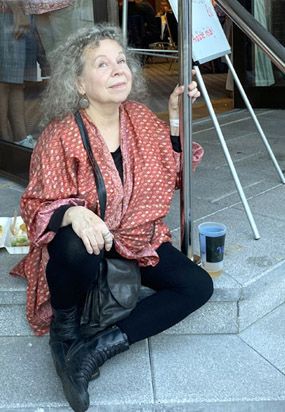
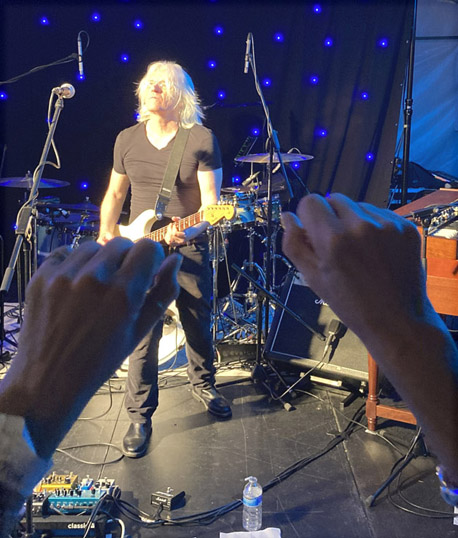
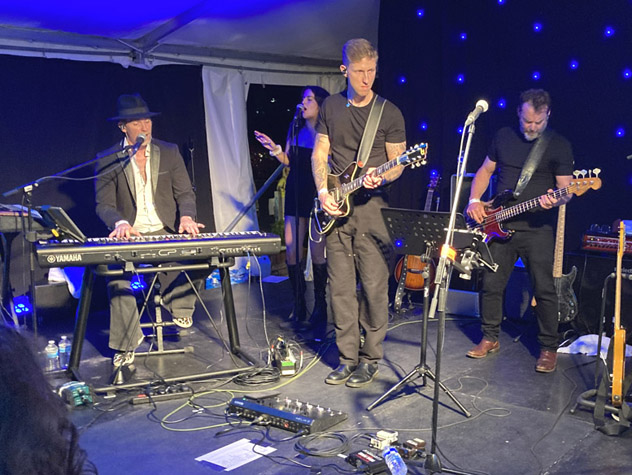
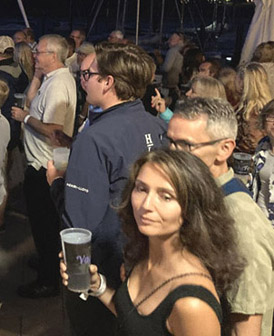 A pair of contrasting Robbie Williams items made an outstanding finale: the
irresistible, melodic Angels, sung by Neil Taylor with suitably
celestial Montage-generated backing choir supplemented by the singing drummer
and bassist (a consistently listenable player). The band then went offstage …
but not for long. The planned encores began with Kids, Sam Tanner
and Lucia Valentine (picture, left) sharing lead vocal parts created by Robbie Williams and
Kylie Minogue, and Neil Taylor relishing the midway rap, enjoining us to ‘grab
our binoculars’. I don’t suppose I ever listened carefully to this song before,
but it made a big impression now, not least with its peculiar, impudent chords
in key places. Jerry Meehan, long-standing bassist to Robbie Williams,
coordinated the ending.
A pair of contrasting Robbie Williams items made an outstanding finale: the
irresistible, melodic Angels, sung by Neil Taylor with suitably
celestial Montage-generated backing choir supplemented by the singing drummer
and bassist (a consistently listenable player). The band then went offstage …
but not for long. The planned encores began with Kids, Sam Tanner
and Lucia Valentine (picture, left) sharing lead vocal parts created by Robbie Williams and
Kylie Minogue, and Neil Taylor relishing the midway rap, enjoining us to ‘grab
our binoculars’. I don’t suppose I ever listened carefully to this song before,
but it made a big impression now, not least with its peculiar, impudent chords
in key places. Jerry Meehan, long-standing bassist to Robbie Williams,
coordinated the ending. 